U.S. officials worried about Chinese control of American drug supply
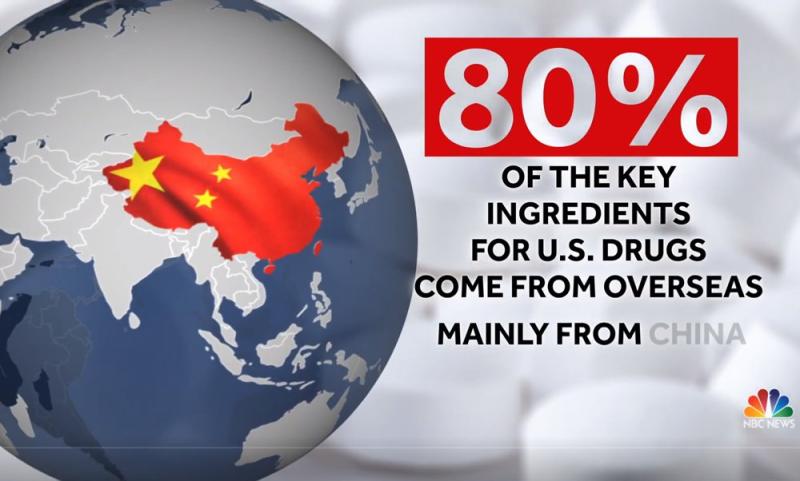


Antibiotics, which turn life-threatening infections into minor nuisances, are considered the single biggest advance in modern medicine.
But imagine if the supply of antibiotics to the United States was suddenly cut off.
American national security officials are worrying about that scenario as they come to grips with this little understood fact: The vast majority of key ingredients for drugs that many Americans rely on are manufactured abroad, mostly in China .
As the U.S. defense establishment grows increasingly concerned about China's potentially hostile ambitions, the pharmaceutical supply chain is receiving new scrutiny .
"If China shut the door on exports of medicines and their key ingredients and raw material, U.S. hospitals and military hospitals and clinics would cease to function within months, if not days," said Rosemary Gibson, author of a book on the subject, "China Rx."
Or, Gibson told NBC News, China could potentially "weaponize our medicines. They can sell us medicines without any medicine in them. They can sell medicines that have lethal contaminants in it."
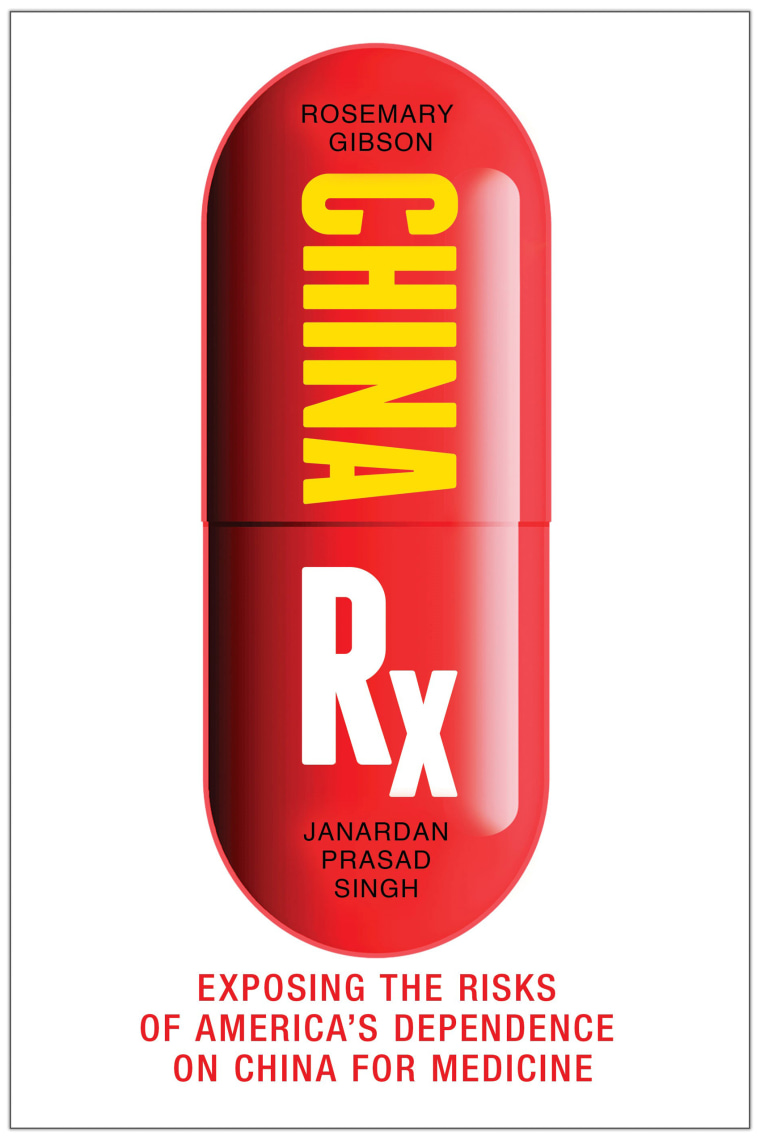
Prometheus Books
Other generic drugs whose key ingredients are manufactured in China include medicines for blood pressure medicine, Alzheimer's, Parkinson's, epilepsy and depression, Gibson says.
"We can't make penicillin anymore," said Gibson. "The last penicillin plant in the United States closed in 2004."
A Chinese manipulation of drug ingredients or supply may seem like a fairly remote possibility. A state-run Chinese paper said this week that there's little chance the government would deliberately harm Americans by cutting off the flow of antibiotics.
But as the Trump administration's trade war with China heats up, a leading Chinese economist gave voice to the worst fears of U.S. policymakers in March, in a speech to an annual national congress.
"China is the world's largest exporter of vitamins and antibiotic raw materials," he said, according to an NBC News translation. "Once the export is reduced, the medical systems of some developed countries will not work."
The Pentagon has noticed.
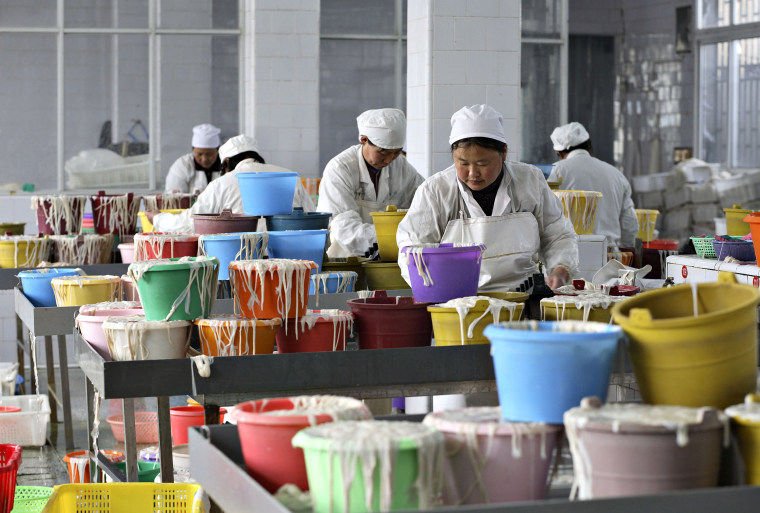
Workers sort pig intestines in a Chinese factory. A mucous membrane from the intestines is cooked to produce a dry substance known as crude heparin, a first step in producing the drug known as heparin. Qilai Shen / Bloomberg via Getty Images file
"The national security risks of increased Chinese dominance of the global API market cannot be overstated," Christopher Priest, the acting deputy assistant director for health care operations and Tricare for the Defense Health Agency, told a U.S.-China advisory panel in Washington this summer.
The Defense Health Agency provides health care and prescription drugs to the military.
Priest told the U.S.-China Economic and Security Review Commission that the White House National Security Council is trying to identify medications most at risk if the Chinese decide to use drug supply as a weapon. An NSC spokesman did not respond to a request for comment.
"Basically we've outsourced our entire industry to China," retired Brig. Gen. John Adams told NBC News. "That is a strategic vulnerability."
Adams, who during a 30-year career served as a military intelligence officer, a military attache in South Korea and deputy U.S. military representative to NATO, added that he believes China understood the implications as it was building a drug ingredients industry.
"I think they know exactly what they're doing and they're incredibly good strategists. They're doing this, they select their industries for the future and they've got a plan."
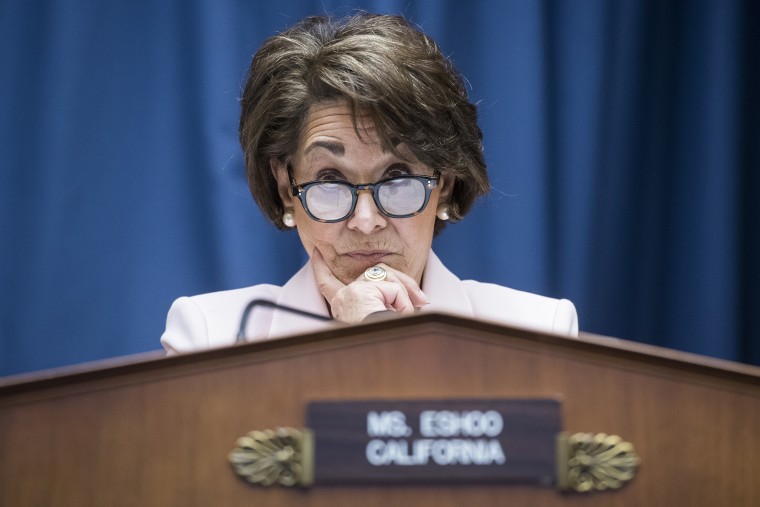
Chairwoman Anna Eshoo, D-Calif., conducts a House Energy and Commerce Subcommittee on Health markup on July 11, 2019. Tom Williams / CQ-Roll Call via Getty Images file
Congress is also focusing on the issue. Two leading House Democrats from California, Adam Schiff and Anna Eshoo, warned in a recent op-ed that "If relations decline further, the Chinese government could look for 'pressure points' where it can wield outsize leverage or force a change of U.S. policy. Pharmaceutical ingredients could be such a vulnerability: By cutting back their supply or manipulating prices, China could cause pharmaceutical costs to surge. Or worse, we could experience shortages."
"We should not be held hostage by any foreign country."
The lawmakers plan to hold hearings soon, they said.
"We should not be held hostage by any foreign country," Eshoo told NBC News. "We need to move away from any country having a monopoly on the ingredients that we depend upon our antibiotics - anthrax, penicillin, high blood pressure drugs."
Even if China doesn't restrict supply, there are also questions about the safety of the manufacturing process.
Contaminated supplies of the blood thinning drug Heparin in 2008 led to the deaths of 149 Americans , the government says, prompting the Food and Drug Administration to establish a new policy of stationing inspectors in overseas plants.
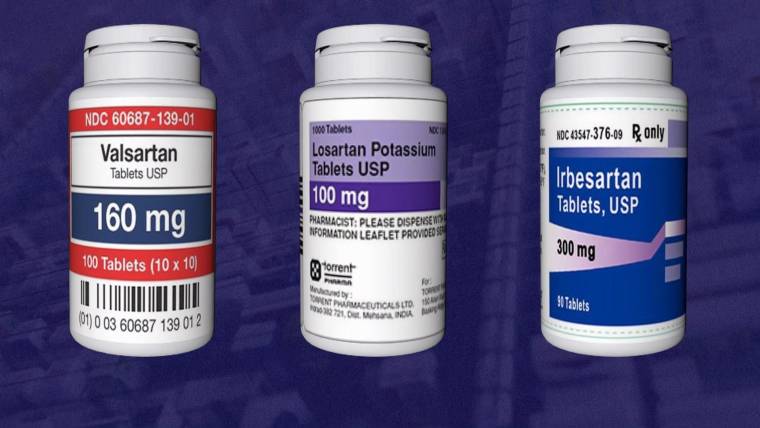
But the FDA's inspection and regulatory regime is widely seen as lax. A congressional investigation in 2016 found that one Chinese company that barred inspectors received only a warning letter, for example.
Last year, the FDA issued an alert over a cancer-causing ingredient used in the blood pressure medication valsartan, made by Chinese company Zhejiang Huahai, resulting in a recall of affected drugs.
Also last year, a scandal over tainted vaccine doses sold in China led to the arrests of executives of Changsheng Biotech, which was also accused of forging data during the production of a rabies vaccine given to infants.
"The FDA is having to make terrible choices between allowing defective medicines on the market and averting drug shortages," Rosemary Gibson told NBC News.
She argues that the U.S should resume making drug ingredients at home.
"We have a lot of empty manufacturing facilities in the United States, and what it takes is refurbishing those with newer technology that can truly make medicines at up to 40 percent less cost," she said. "We just need the upfront investment. And it won't happen unless there is public support and public funding for that."




Our government is great at borrowing and spending with reckless abandon and spending intense effort in partisan battles. Stories like this reveal how they fail to look after the major interests of the American people.
... and this is why american corporations need to be heavily regulated. it's all about the money to them.
Bingo..
Although I truly doubt that China would endanger the health and well-being of the American public, the fact that it has the ability to do so should be taken into consideration by Trump who likes playing Trade War games. That does not mean that although China might not cut off the supply of medicines and rare earth minerals (required by electronics manufacturers) it could very well make them more expensive.
Even Chinese pet foods are toxic, but we want to import materials for drugs for people? Seems like a bad idea.
You intentionally used the present tense, but your reference was over a decade ago, and the perpetrators were indicted for it. Do you have a reference to anything more recent? If you don't, perhaps to be HONEST you should change the tense of your comment.
since those pharma chemicals are sold by the pound/kilo, the chinese are probably adding lead to them too, like most all the other raw materials they sell.
There is an unfortunate pattern. Pet food, toothpaste, children's toys with lead paint, baby formula, and now pharmaceuticals. I remember having to go through my son's Thomas the Tank Engine toys to get rid of the wooden ones, because he was a toddler during that time and loved Thomas.
You've got that spot on.
My secretary's husband was taking one of the BP meds that was found to be contaminated. A month or so ago, he tried to refill his prescription, and could only find a few weeks' supply at Costco. No local pharmacies had any, and they didn't expect to have any in stock any time soon. So he had to take the few weeks' supply he could find, and his doctor will have to put him on new meds. For many folks, finding the right med or med combination for blood pressure control is a process of trial and error. Starting over can be a real inconvenience.
Not to mention I think they're supposed to be, or were, the biggest supplier of illegal fentanyl, aren't they? I'm beginning to think they are a much worse enemy than Russia is.
Some sources say China is, or was, which China denies. Some say Mexico.
I'm not really sure I'd consider them an enemy due to this. It doesn't seem that US citizens are being targeted, and I believe it was primarily Chinese children harmed by melamine-laced infant formula. It just seems that safety is easily disregarded by some in the face of potential profits.
That certainly made headlines here - and the owner of the company was sentenced to death because of it.
China sold poisoned toothpaste and pet food before, resulting in the deaths of people and pets in different countries. I have no doubt they will do it again.
Yes Paula, China certainly really wants people who use its products all over the world to die from using them, because that makes it so easy for China to export their products for the benefit of their economy.
I will add this, long term vs short term thinking and action.
We, as Americans, think in terms of the next election. China (among other countries) think in generational terms.
Be really neat if non-Indians started thinking of how to better the Seventh Generation instead of themselves in the present, eh?
I was just thinking that Native Americans were able to survive and thrive for thousands of years without having to outsource anything.
over the yrs they have outsourced many sectors of our nations production capabilities.
a very bad plan in terms of national security
Yes, capitalism has collapsed. The industrial infrastructure of the United States has been decimated to serve the interests of finance. And no one seems to recognize that how finance functions is more socialist than capitalist. Finance has imposed central planning onto the US industrial sector; our economy has been transformed by finance to centralized control over supply to maximize profit and has removed the capitalist demand/production control over supply.
Geopolitics isn't the only concern. The United States has become vulnerable to disruptions by natural disasters, too. A pandemic in China would cause extreme shortages in the United States that would cause deaths, too. A major earthquake and tsunami that impacts the west coast could close sea ports for months.
The real problem is many Americans have priced themselves out of the market. If you can buy the same quality product from people that are willing to do the work for less that’s where the goods will be produced.
I disagree. The problem as I see it is that investment has shifted away from building durable wealth and toward building currency wealth. Financial investors are profiting from currency exchange rates. Stock value does not represent durable wealth.
Foreign labor is cheaper than US labor primarily because of currency exchange rates. Japan, as an example, does not have low cost labor yet Japan maintains a competitive advantage through currency exchange rates.
Chinese workers are paid a wage that provides a middle class lifestyle. But Chinese wages are paid with a lower value currency compared to the United States. Labor costs in China are comparable to labor costs in the US but the currency exchange rate makes Chinese labor cheaper compared to US labor.
Starting in the 1950's Japan was the low-cost provider of certain goods. As their economy grew and their middle class did likewise the labor costs increased so some production moved to Taiwan and South Korea. They experienced the same increase and production moved to China, etc, etc. Production of certain goods will always follow the lost cost area. Business has been repositioning out of China to other lower-cost areas like Vietnam for the last couple of years.
Countries that were once low cost have production/factories in the new low-cost countries.
This is how business works. It isn't going to change much.
Come off it. That's a hysterical exaggeration. There are hundreds of billionaires in China who own real estate or electronics or other manufacturing corporations. Have you never heard of Jack Ma and his corporation Alibaba? If there are hundreds of billionaires, there sure have to be an awful lot of millionaires as well who own property or manufacturing corporations or other types of enterprises.
But the relationship between government and business in China is not like the United States. Particularly concerning government/business joint ventures and the role of the CCP in business operations.
So, the claim that Chinese businesses are state owned isn't really a gross exaggeration since the government can (and does) intervene in operation of businesses with or without ownership.
Granted that there are businesses in China that are state-owned, and others that are joint ventures, but there are a hell of a lot that the government does NOT have a piece of, but that does not mean that the government does not impose regulations on businesses any different than the American or Canadian or British or Australian or German or French or....etc. governments do. I can't imagine there to be so many millionaires, billionaires and just plain rich people (like my wife's brother) here if the government wanted China to be a "From each according to his abilities to each according to his needs" way of life, having complete control over everyone. So where in the world ISN'T there government intervention?
And then, of course, there could be Yellowstone....
And now there are carcinogens in heartburn meds:
Same substance as in valsartan.
Whew! Not the one I use